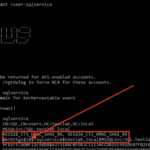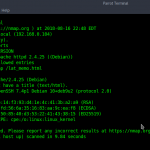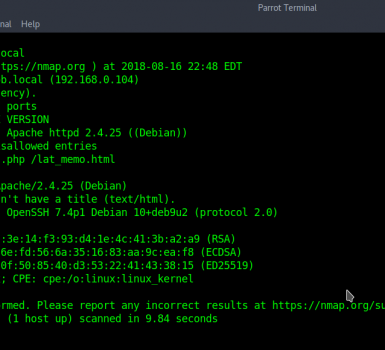
Ethical hacking is an authorized practice of bypassing system security to identify potential data breaches and threats in a network. The company that owns the system or network allows cyber security engineers to perform such activities to test the security of the system. Thus, unlike malicious hacking, this process is planned, approved and, more important, legal.
Ethical hackers aim to investigate systems or networks for weak points that malicious hackers may exploit or destroy. They collect and analyze information to explore ways to strengthen the security of systems / networks / applications. By doing this, they can improve the security footprint so that it can better withstand attacks or divert them.
Ethical hackers are hired by organizations to look into the vulnerabilities of their systems and networks and develop solutions to prevent data breaches. Consider it a high-tech permutation of the old saying “a thief is needed to catch a thief.”
They check for key vulnerabilities include but are not limited to:
- Injection attacks
- Changes in security settings
- Exposure of sensitive data
- Breach in authentication protocols
- Components used in the system or network that may be used as access points
Now, as you have the idea of what is ethical hacking, it’s time to learn the type of hackers.
Type of Hackers
The practice of ethical hacking is called “white hat” hacking, and those who do it are called white hat hackers. In contrast to ethical hacking, “black hat” hacking describes practices related to security breaches. Black hat hackers use illegal techniques to compromise the system or destroy information.
Unlike white hat hackers, “gray hat” hackers do not ask for permission before getting into your system. But Gray Hats are also different from Black Hats because they do not do hacking for the benefit of any individual or third party. These hackers do not have hack systems with any malicious intent and for fun or other various reasons, which usually inform the owner of any threat. Gray hat and black hat hacking are both illegal because they both constitute an unauthorized system violation, even though both types of hackers have different intentions.
White Hat Hackers
Not all hackers are villains, as mentioned earlier, some are also heroes. A white hat hacker is a person who morally breaks into information or security systems. He does not obtain information with malicious intent but for moral reasons. White hat hackers are designated as security experts in organizations. They take various measures and shields to break down the information system to obtain data which is useful for the organization. They are legally allowed to do so and are often called Ethical Hackers. In fact, there are professional certifications that certify as a Certified Ethical Hacker. The CEH certification is one of the popular IT security certifications for security professionals. With the increasing number of cyber threats, the demand for ethical hackers is increasing day by day.
Black Hat Hackers
Not every hacker is a cracker but that does not mean there is no cracker. Black hat hackers are called crackers. As opposed to white hat hackers, black hat hackers are about to break into information systems with malicious intent. They hack computer systems, email and others for fraudulent purposes. They dig into other’s computer systems, phone systems, accounts, etc., and obtain details that may harm the owner. A lot of cyber crime is the result of black hat hackers. They use people’s personal information to commit robbery, fraud, vandalism and more. Since these groups of hackers are immoral, they are punishable by law for the crimes they commit.
Gray Hat Hackers
Everything cannot be kept in black and white; There is always a gray area and the same happens with hackers. A gray hat hacker exhibits signs of both white and black hat hackers. These types of hackers usually unethically dig into others’ systems, while doing no such malicious harm. Many gray hat hackers break into other’s account and information systems, pulling in details and informing the administrator of the accident. In addition, they offer to fix the problem against certain charges. Thus, they hack others’ systems to fix it later to gain some earnings.
Elite hacker
As technology masters, so do hackers. Elite hackers fall into this category. The elite hacker is a social designation indebted to hackers who are the most skilled at hacking. They have expert skills to break down information systems and easily pull in data and information. Elite hackers can use their expert skills in both White Hat Hacking and Black Hat Hacking.
script kiddie
As are good artists and bad artists, there are elite hackers and script kiddies. A script kiddie is someone who is an amateur in the field. He does not break through his skills into other systems but uses automated scripts to do so. Tools and software used by other hackers to break into information systems. Like elite hackers, script kiddies can also pursue white hat hacking and black hat hacking. Thus, there are different types of hackers who operate with different purpose in the IT security world. Although everyone’s job is to break the other’s system and get information, they do it with a different purpose and purpose makes them different from each other.
How to become an ethical hacker
Any hacker must take some common steps to become an ethical hacker, the bare minimum of which is to make sure you have documented permission from the right people before breaking into something. Not breaking the law is paramount to being an ethical hacker. All professional penetration testers should follow a code of ethics to guide everything they do. The EC-Council, creators of the Certificated Ethical Hacker (CEH) exam, have one of the best public code of ethics available.
There are two ways in which most ethical hackers become professional penetration testers. Either they learn hacking skills on their own or they take formal education classes. Many like me, both did. Although sometimes mocked by self-learners, ethical hacking courses and certifications are often a gateway to a well-paid job as a full-time admissions examiner.
Today’s IT security education curriculum is full of courses and certifications that teach someone to be an ethical hacker. For most certification exams you can study on your own and bring your experience to the testing center or take approved education courses. While you do not need an ethical hacking certification to be employed as a professional penetration tester, it cannot hurt.
As a CBT Nuggets trainer, Keith Barker said, “I think the opportunity to do ‘certified ethical anything’ on your resume may only be a good thing, but it is the way to enter into more study.” Also, if companies see that you are certified in ethical hacking, they know that you have seen and agreed to a particular code of conduct. If an employer is looking at resumes and they see someone whose Has an ethical hacking certification and no one has got it to help. ”
Even though they teach the same skill, but every ethical hacking course and certification is different. Do a little research to find the right one for you.
5 top ethical hacking courses and certifications
- Certified Ethical Hacker
- SANS GPEN
- Offensive Security Certified Professional
- Foundstone Ultimate Hacking
- CREST
Certified Ethical Hacker
The EC-Council’s Certificate Ethical Hacker (CEH) is easily the oldest and most popular penetration course and certification. The official course, which can be taken online or with a live in-person instructor, contains 18 different subject domains including traditional hacking subjects, plus modules on malware, wireless, cloud and mobile platforms. The full remote course includes six months of access to the online Cyber Range iLab, which will allow students to practice over 100 hacking skills.
Sitting for the CEH certification requires taking an official course or, if self-study, proof of two years of relevant experience or education. It contains 125 multiple-choice questions with a four-hour time limit. Taking the exam requires accepting the EC-Council’s Code of Ethics, which was one of the first required codes of ethics required of computer security test takers. The courseware and testing is routinely updated.
SANS GPEN
SysAdmin, Networking, and Security (SANS) Institute is a highly respected training organization, and anything they teach along with their certifications are greatly respected by IT security practitioners. SANS offers multiple pen testing courses and certifications, but its base GIAC Penetration Tester (GPEN) is one of the most popular.
The official course for the GPEN, SEC560: Network Penetration Testing and Ethical Hacking, can be taken online or live in-person. The GPEN exam has 115 questions, a three-hour time limit, and requires a 74 percent score to pass. No specific training is required for any GIAC exam. The GPEN is covered on GIAC’s general code of ethics, which they take very seriously as attested to by a running count of exam passers who have been disqualified for violating the code.
“I like that the [GPEN exam] is linked to practical skills that penetration testers have to do every day,” says Goudis. “It covers everything from scoping, engagement rules, and reporting to testing everything from a detailed technical standpoint. The exam is very scenario focused, so it will present the given entrance exam scenario and ask what is the best way forward. Or, it will show you the output from a tool, and ask what the tool is telling you and what you should do next. I appreciate it very much, because it measures real-world skills better. The exam does not have a lot of questions that are only definitive, where they have a sentence that is missing a word and ask you which of the following words is the best in the sentence. This is not a good way to measure skills. ”
Offensive Security Certified Professional
The Offensive Security Certified Professional (OSCP) course and certification has gained a well-earned reputation for toughness with a very hands-on learning structure and exam. The official online, self-paced training course is called Penetration Testing with Kali Linux and includes 30 days of lab access. Because it relies on Kali Linux (the successor to pen testers’ previous favorite Linux distro, BackTrack), participants need to have a basic understanding of how to use Linux, bash shells and scripts.
The OSCP is known for pushing its students and exam takers harder than other pen testing paths. For example, the OSCP course teaches, and the exam requires, the ability to obtain, modify and use publicly obtained exploit code. For the “exam”, the participant is given instructions to remotely attach to a virtual environment where they are expected to compromise multiple operating systems and devices within 24-hours, and thoroughly document how they did it. Offensive Security also offers even more advanced pen testing courses and exams (e.g., including involving web, wireless, and advanced Windows exploitation). Readers may want to take advantage of their free, online basic Metasploit tool course.
Foundstone Ultimate Hacking
McAfee’s Foundstone business unit (which I worked for over 10 years ago) was one of the first hands-on penetration testing courses available. Its series of Ultimate Hacking courses and books led the field for a long time. They covered Windows, Linux, Solaris, web, SQL, and a host of advanced hacker techniques (such as tunneling). Unfortunately, Ultimate Hacking courses don’t have formal exams and certifications.
Today, Foundstone offers a host of training options well beyond just pen testing, including forensics and incident response (as do many of the other players in this article). Additionally, Foundstone offers training in hacking internet of things (IoT), firmware, industrial control security systems, Bluetooth and RFID. Foundstone instructors are often real-life pen testers and security consultants, although many, if not most, of the training courses are handled by partners.
CREST
Internationally, the not-for-profit CREST information assurance accreditation and certification body’s pen test courses and exams are commonly accepted in many countries, including the United Kingdom, Australia, Europe, and Asia. CREST’s mission is to educate and certify quality pen testers. All CREST-approved exams have been reviewed and approved by the UK’s Government Communication Headquarters (GCHQ), which is analogous to the United States’ NSA.
CREST’s basic pen testing exam is known as the CREST Registered Tester (or CRT), and there are exams for web and infrastructure pen testers. Exams and costs vary by country. CREST test takers must review and acknowledge the CREST Code of Conduct. The Offensive Security OSCP certification can be used to obtain the CRT.
All the instructors convinced me that the courses they taught were only a beginning. Barker of CBT Nuggets said, “[Certification exams] are a great entry point and exposure to all the foundations you can then grow more.”
“Each of our classes] is not just a standalone class that someone takes for six days and then disappears,” Scaudis says. “Instead, our classes are more like an ecosystem, centered around 6 days of training, but follow the blog for further learning with webcasts. In addition, we will help our previous students in this ecosystem Have been super fortunate to contribute their own blog and tool development, giving back to the community. It’s truly a beautiful virtuous cycle, and I’m so grateful to be a little part of it. ”
Ethical Hacking Course Free Download











I really like the design and contents of your web page
I enjoyed reading a very successful article
Spot on with this write-up, I truly suppose this website needs way more consideration. I抣l most likely be again to learn far more, thanks for that info.
An impressive share, I simply given this onto a colleague who was doing a little bit evaluation on this. And he in fact bought me breakfast as a result of I discovered it for him.. smile. So let me reword that: Thnx for the treat! But yeah Thnkx for spending the time to discuss this, I feel strongly about it and love studying more on this topic. If doable, as you develop into experience, would you thoughts updating your blog with extra particulars? It is highly useful for me. Large thumb up for this weblog publish!